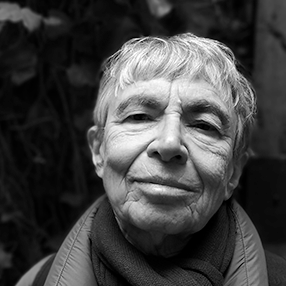For Despina
Why is it I don’t like closing the curtains?
Even pinning panels of blue voile together
cuts me off too much from the winter morning’s
comings and goings
and the tall, reassuring neighbors’ windows
some with window boxes, some with their shades down
some cracked open from last night, so cold air could
refresh a sleeper.
Pick the stitch up, there in the place I dropped it.
Weave the raveled sides of the day together
if December sun in a bedroom window
calls for a garment.
There are alphabets I could still decipher,
learn to read a stanza, or write my name in.
There are conjugations of verbs instructing
speech, song and silence.
Fear or hope or both of them made of me a
child who thought I’d probably be abandoned
if I misbehaved, if I lied about my
parents–or didn’t.
How are you a Jew? asked the young Greek woman.
First, because I haven’t the choice to not be.
Those who thought they chose found the same unchosen
barbed wire and ashes.
How am I a Jew? Through my mother’s birthright,
turned into a death warrant once; excuse to
seize the farms and villages of a people
“exiled by exiles.”
You, the dead, my interlocutors, whether
friends or strangers–child on a no-man’s land, her
satchel and school uniform clear in gunsights,
riddled with bullets–
while I clutch the moment, with a safe childhood
as my history, no grandparents’ village,
no street where her father made shoes, his mother
measured out barley.
Strange that all I know of them is–religion?
Not if they had land, sent their sons to cheder;
not which ones spoke Yiddish, Hungarian, or
Polish, or German.
Not which child, renamed, fed the pigs and dug up
frozen mud for potatoes; not whose notebook
browned inside a cupboard, while trains moaned through the
Galician winter.
Must a murdered child, after generations,
be avenged by gunning down other children
far away from winter and pigs, potatoes
and nameless railroads?
If a Jew may not deconstruct the question
(two Jews, didn’t we say, and three opinions?)
if they call the peacemakers anti-Semites,
who are my cousins?
Lost lands which I never would call my country. . . .
How are you American? she might ask me.
Language, economic determination. . . .
Once, it was lucky.
